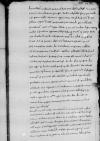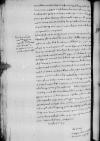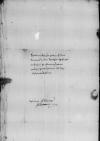Dudum anhelabam scire, quomodo res ⌊patriae nostrae⌋ ⌊Cracoviae⌋ agerentur. Non est dies, quin de iis sollicite cogito. Tandem praesentati sunt articuli per ⌊nobilitatem Prussianam⌋ coram ⌊maiestate regia⌋ oblati, quos animo turbato legi reperique multa, quae secus ac signata sunt, se habent, verum, quod nos se facturos obtulimus, id sibi usurpant, quasi ipsi id superinscribed⌈idid superinscribed⌉ a nobis exegissent.
Dicunt etiam, quod propter absentiam districtus Dersoviensis, qui non satis tempestive vocati, alii in contributionem consentire nolebant. Cum tamen profitentur in tribus conventionibus sollicitatum esse, si semel districtus Dersoviensis fortasse serius vocatus esset, tamen in aliis conventibus satis tempestive intimatum est. Et alia plura possent elici pro responso dando, sed est quasi quaedam altercatio, nec contenti, quod contra ⌊consiliarios⌋ se opponunt, immo et ⌊regiam maiestatem⌋ obstringere nituntur, ut pecuniam sibi contributam non habeat expendendi facultatem, nisi eorum assensu, cum tamen minimum est, quod ⌊nobilitas⌋ contribuit, nec comparatur cum contributione civitatum. Et revera, si recte perpenditur, non potuit talis pecunia utilius pro ⌊republica nostra⌋ expendi, sed ⌊maiestas regia⌋ haec et similia illis obtrudet et merito dicere posset:
cf. Vulg. Mt 20.13-15 At ille respondens uni eorum dixit: Amice, non facio tibi iniuriam. Nonne ex denario convenisti mecum? Tolle, quod tuum est, et vade, volo autem et huic novissimo dare, sicut et tibi. Aut non licet mihi, quod volo, facere? An oculus tuus nequam est, quia ego bonus sum? ⌊Amice, non facio tibi iniuriam. An non licet facere, quae volo?cf. Vulg. Mt 20.13-15 At ille respondens uni eorum dixit: Amice, non facio tibi iniuriam. Nonne ex denario convenisti mecum? Tolle, quod tuum est, et vade, volo autem et huic novissimo dare, sicut et tibi. Aut non licet mihi, quod volo, facere? An oculus tuus nequam est, quia ego bonus sum? ⌋
etc.
Quod vero tam acriter invecti sunt in communem amicum nostrum, dominum ⌊Ioannem a Werden⌋ etc., videntur certe non servasse decorum, q(uo)d in omni re et actione servari deberet. Et si eius status rationem habere noluissent, quem immerito obiurgare statuer(un)t, tamen ob reverentiam ⌊maiestatis regiae⌋, cuius dignitatem, auctoritatem, maturitatem et senium animadverti in tam laudabili consessu primorum regni se a tam dira invectione et irrogatione contumeliae continere debuissent,  BCz 1595, p. 830 nec videtur causam subesse tam vehementi expostulationi, praesertim cum benemereri visus sit in ⌊nobilitatem⌋ plurimorum testimonio. Consolandus esset praefatus dominus ⌊Ioannes a Werden⌋ etc. eam contumeliam susque deque ferre, quae plus dedecoris calumniantibus inussit, quam illi, quem infamia notare conati sunt. Quid est, quod hic pro ampliando honore insteterit? Cum quotusquisque eorum, qui eum insimulant, si fortuna dederit, id non optare(n)t seu
acceptare(n)t or acceptaret⌈acceptare(n)tacceptare(n)t or acceptaret⌉.
BCz 1595, p. 830 nec videtur causam subesse tam vehementi expostulationi, praesertim cum benemereri visus sit in ⌊nobilitatem⌋ plurimorum testimonio. Consolandus esset praefatus dominus ⌊Ioannes a Werden⌋ etc. eam contumeliam susque deque ferre, quae plus dedecoris calumniantibus inussit, quam illi, quem infamia notare conati sunt. Quid est, quod hic pro ampliando honore insteterit? Cum quotusquisque eorum, qui eum insimulant, si fortuna dederit, id non optare(n)t seu
acceptare(n)t or acceptaret⌈acceptare(n)tacceptare(n)t or acceptaret⌉.
Sed quid ad eos de coadiutoriis, quae miram et ⌊papae⌋ et serenissimi ⌊regis⌋ dispositionem sibi vendicat, cum etiam non latet serenissimam regiam ac reginalem maiestates suapte, etiam inscia Paternitate Vestra, de episcopatu Warmiensi providere statuissent on the margin⌈cum etiam non latet serenissimam ⌊regiam ac reginalem maiestates⌋ suapte, etiam inscia Paternitate Vestra, de ⌊episcopatu Warmiensi⌋ providere statuissentcum etiam non latet serenissimam regiam ac reginalem maiestates suapte, etiam inscia Paternitate Vestra, de episcopatu Warmiensi providere statuissent on the margin⌉. Si contendunt nobilibus conferri, Paternitas Vestra non cedet ⌊illis⌋ de actione nobilitatis, qui non solum prioribus praeluxit, sed et a ⌊caesarea maiestate⌋ novis insignis et aliis praerogativis decorare merita est. Nec dominus ⌊Tidemannus Gise⌋ abest a nobilitate, cuius virtus meruit, ut ⌊maiestas regia⌋ eum nobilitate decoravit et insigniis ornavit. Non habent ergo ansam expostulandi. Alios docent se continere intra suam ipsius pelliculam, cum ⌊ipsi⌋ multo metas transiliunt.
Orandus est Deus, ut seditiones, quibus iam scatet mundus, ab hoc inclito ⌊regno⌋ et ⌊patria nostra⌋ avertere et sanam nobis omnibus nostratibusque mentem largire dignetur. Plura scribere vetat tempus, nuntio properante, alias ad singula respondissem, sed vereor, ne dicar sus minervam docere. Velit denique Reverendissimam Paternitatem Vestram oratum or oratam⌈oratumoratum or oratam⌉ habere.
Dignetur me causasque meas sibi commendatas habere, quas prioribus litteris signavi, et una cum domino ⌊Czema⌋ etc. castellano Gdanensi aliisque ad hoc rogandis non gravare ⌊maiestatem regiam⌋ interpellare, quo voti compotes fiamus.
Non possum celare Reverendissimam Dominationem Vestram me gratia Dei melius habere, quamvis adhuc non superinscribed⌈nonnon superinscribed⌉ usquequaque sanus, adhuc defectus in pedibus non licet adusque exire domum. Continere ad tempus oportet.
Cum his me Reverendissimae Dominationi Vestrae recommendo. Quam felicissime valere ex animo cupio.
 BCz 1595, p. 830 nec videtur causam subesse tam vehementi expostulationi, praesertim cum benemereri visus sit in
BCz 1595, p. 830 nec videtur causam subesse tam vehementi expostulationi, praesertim cum benemereri visus sit in 

